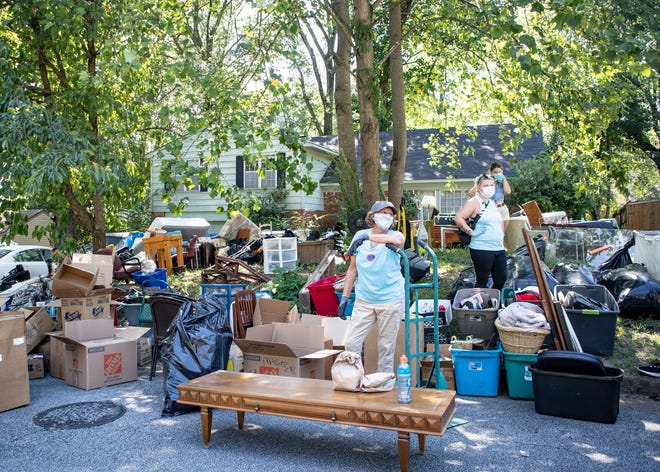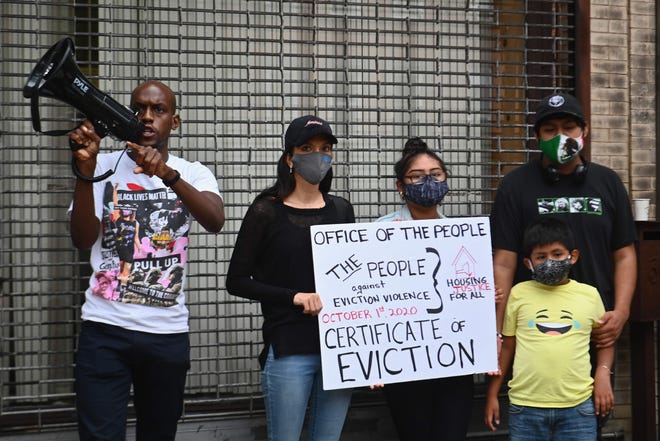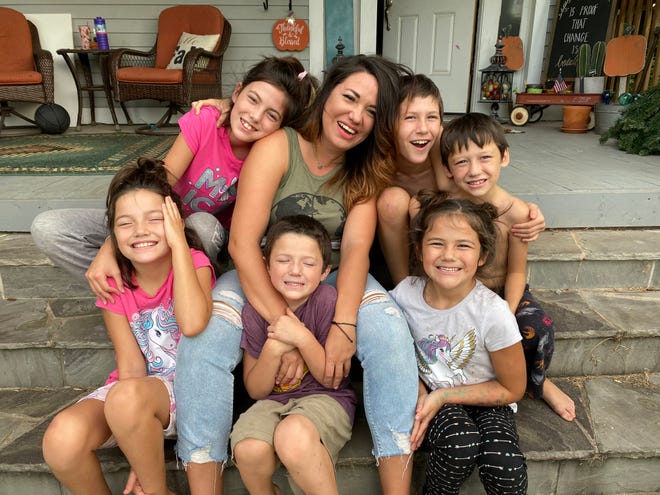Millions of Americans face eviction amid COVID-19: 'I have no idea what to do.'
Emerging COVID-19 relief package must include accessible emergency rental assistance and a uniform, enforceable eviction ban.
Suzette Hackney
USA TODAY
Before the COVID-19 pandemic hit, single mother Alora Manny was working third shift at an Amazon fulfillment center in Phoenix. Though she had a two-hour commute by bus, she was able to support her three children and pay the $1,248 in monthly rent for her one-bedroom apartment near downtown.
Manny, 31, loved her job and earned $1,200 to $1,500 per week, often picking up extra hours. But when Phoenix implemented passenger limits on public transportation to prevent the spread of COVID-19, Manny's two-hour commute turned into a four-hour journey some days. She would wait at the bus stop, only to watch the shuttles drive past her because they were at capacity. After arriving late to work a fifth time, Manny lost her job.
She fell behind on bills and was unable to pay rent in August. Desperate for help, Manny reached out to social services organizations that told her not to panic because a nationwide moratorium on evictions would serve as a lifeline. She submitted a sworn affidavit stating she had lost her income and presented it to her landlord. A few weeks later in September, deputies were at her door. They said: "You have to go."
"I kept getting eviction notices on my door," Manny told me. "I filled out all of my paperwork. I did what I was told to do. To end up homeless is so devastating; I've never been in this situation before. I really wasn't even given a chance."
Manny and her children, Amelia, 13, Audrina, 12, and Robert Jr., 3, are now bouncing around from cheap motels to friends' couches because emergency shelters are overflowing with others in need. They are trying to survive on her unemployment benefits: $218 per week.
Millions of Americans like Manny are falling through the cracks during this pandemic-induced financial and housing crisis. And we haven't seen the worst of it. The Centers for Disease Control and Prevention's eviction moratorium, which went in effect in September, protects renters who have been unable to meet their monthly payments from being tossed on the street. It is set to expire Dec. 31.
An estimated 12.4 million adult renters say they are behind on payments, according to the latest U.S. Census Bureau survey. And nearly 83 million adults report they are finding it somewhat difficult or very difficult to cover their household expenses such as food, rent or mortgages and car payments.
All told, an estimated 30 to 40 million Americans could be at risk of residential eviction in January because they are unable to pay their rent, according to an analysis by the Aspen Institute, a nonpartisan policy think tank. America is failing the backbone of this nation: its people

But many landlords are suffering, too. We often envision monolith corporations charging thousands of dollars for efficiency apartments around the country as the enemy. In reality, more than half of all rental properties are single-family homes, often owned by mom-and-pop landlords. Mortgages and property taxes still need to be paid, as does maintenance and sometimes utilities. As Congress continues its down-to-the-wire negotiations, landlord financial assistance should also be on the table.
Monica Delancy, a renters' rights advocate who helps residents in Georgia's Cobb County, said many families she works with are ineligible for local assistance because they must be able to prove that they will be able to pay rent in arrears — people whose work hours have already been reduced and serve as the primary caregiver to children who are learning virtually at home due to COVID-19. She's working with dozens of families to try to help them negotiate payment plans with their landlords.
"You cannot pay $1,000 a month in rent plus what you already owe on $10 or less an hour," Delancy, founder and executive director of We Thrive in Riverside Renters Association. "Right now, we know that on Jan. 1 the landlord can go to the court and ask for the eviction writs to be served, and there’s nothing we can do about it. Forced evictions are traumatic. We're at the point now where we're just asking for the tenants to have some notice so they can start packing. We want to avoid someone having a padlock put on their door or their stuff put out on the curb. Give them 48 hours before the sheriff comes to gather their personal belongs and get it in storage. We want these people to be able to move with decency."
Some states and legal aid providers, including Texas and New York, have launched online portals to help residents understand the eviction process and inform them of their rights. Other organizations have turned to social media to reach as many people as possible during this housing crisis.
Hannah Adams, a staff attorney for Southeast Louisiana Legal Services, which represents tenants during evictions in 22 parishes across the New Orleans area, held a virtual session on Facebook for those seeking information. As I watched, I couldn't help but cry. Is this really where we are as a country?
“People are really, really struggling right now," Adams said during the live broadcast. "A lot of people are not back to work. A lot of people are relying on the expanded unemployment benefits from the federal government that ended at the end of July. I know many, many people who are getting 100 bucks a week from unemployment right now and that’s it. So obviously that is not enough to live on, let alone pay rent, and unfortunately it doesn’t appear that this pandemic is ending anytime soon."
Few people could have anticipated the tremendous financial fallout spurred by COVID-19. But as it continues to cripple tens of millions of Americans, Congress must step up. In our lifetimes, we have never experienced an economic and public health crisis like this one. A wave of homelessness like we've never seen is imminent.
America is failing its people. It doesn't have to be this way.
National columnist Suzette Hackney is a member of USA TODAY’S Editorial Board. Contact her at shackney@usatoday.com or on Twitter: @suzyscribe
Emerging COVID-19 relief package must include accessible emergency rental assistance and a uniform, enforceable eviction ban.
Suzette Hackney
USA TODAY
Before the COVID-19 pandemic hit, single mother Alora Manny was working third shift at an Amazon fulfillment center in Phoenix. Though she had a two-hour commute by bus, she was able to support her three children and pay the $1,248 in monthly rent for her one-bedroom apartment near downtown.
Manny, 31, loved her job and earned $1,200 to $1,500 per week, often picking up extra hours. But when Phoenix implemented passenger limits on public transportation to prevent the spread of COVID-19, Manny's two-hour commute turned into a four-hour journey some days. She would wait at the bus stop, only to watch the shuttles drive past her because they were at capacity. After arriving late to work a fifth time, Manny lost her job.
She fell behind on bills and was unable to pay rent in August. Desperate for help, Manny reached out to social services organizations that told her not to panic because a nationwide moratorium on evictions would serve as a lifeline. She submitted a sworn affidavit stating she had lost her income and presented it to her landlord. A few weeks later in September, deputies were at her door. They said: "You have to go."
"I kept getting eviction notices on my door," Manny told me. "I filled out all of my paperwork. I did what I was told to do. To end up homeless is so devastating; I've never been in this situation before. I really wasn't even given a chance."

Manny and her children, Amelia, 13, Audrina, 12, and Robert Jr., 3, are now bouncing around from cheap motels to friends' couches because emergency shelters are overflowing with others in need. They are trying to survive on her unemployment benefits: $218 per week.
Millions of Americans like Manny are falling through the cracks during this pandemic-induced financial and housing crisis. And we haven't seen the worst of it. The Centers for Disease Control and Prevention's eviction moratorium, which went in effect in September, protects renters who have been unable to meet their monthly payments from being tossed on the street. It is set to expire Dec. 31.
An estimated 12.4 million adult renters say they are behind on payments, according to the latest U.S. Census Bureau survey. And nearly 83 million adults report they are finding it somewhat difficult or very difficult to cover their household expenses such as food, rent or mortgages and car payments.
All told, an estimated 30 to 40 million Americans could be at risk of residential eviction in January because they are unable to pay their rent, according to an analysis by the Aspen Institute, a nonpartisan policy think tank. America is failing the backbone of this nation: its people
.
Eviction moratoriums are not enough, though Congress must push to extend the CDC's beyond the end of the year. The wealth gap is quickly becoming a chasm as Americans continue to die by the thousands even as the stock market reaches new heights. Any new coronavirus rescue package must include accessible emergency rental assistance and a uniform, enforceable eviction ban that will remain in effect until a high percentage of the population is vaccinated and the transmission of the virus slows.
"I don't know how I'm going to get through this," Manny said. "I have no idea what to do."
Struggling to make ends meet
Americans with the lowest-income households — low-wage and essential workers — also tend to be people of color. They have already been ravaged by COVID-19, experiencing higher infection and death rates. Women and communities of color also are disproportionately more likely to owe back rent, according to Census data, including about 29% of Black families and 17% of Latino tenants.
The numbers are as astonishing as they are unmanageable for many Americans, those who were struggling to make ends meet prior to the pandemic. In an August report, Moody’s Analytics estimated that 12.8 million Americans would be behind an average of $5,400 in rent, and that debt could balloon to nearly $70 billion by the end of the year. Rent moratoriums do not forgive or reduce payments. When the system works, the immediate threat of eviction is simply delayed.

Eviction moratoriums are not enough, though Congress must push to extend the CDC's beyond the end of the year. The wealth gap is quickly becoming a chasm as Americans continue to die by the thousands even as the stock market reaches new heights. Any new coronavirus rescue package must include accessible emergency rental assistance and a uniform, enforceable eviction ban that will remain in effect until a high percentage of the population is vaccinated and the transmission of the virus slows.
"I don't know how I'm going to get through this," Manny said. "I have no idea what to do."
Struggling to make ends meet
Americans with the lowest-income households — low-wage and essential workers — also tend to be people of color. They have already been ravaged by COVID-19, experiencing higher infection and death rates. Women and communities of color also are disproportionately more likely to owe back rent, according to Census data, including about 29% of Black families and 17% of Latino tenants.
The numbers are as astonishing as they are unmanageable for many Americans, those who were struggling to make ends meet prior to the pandemic. In an August report, Moody’s Analytics estimated that 12.8 million Americans would be behind an average of $5,400 in rent, and that debt could balloon to nearly $70 billion by the end of the year. Rent moratoriums do not forgive or reduce payments. When the system works, the immediate threat of eviction is simply delayed.

But many landlords are suffering, too. We often envision monolith corporations charging thousands of dollars for efficiency apartments around the country as the enemy. In reality, more than half of all rental properties are single-family homes, often owned by mom-and-pop landlords. Mortgages and property taxes still need to be paid, as does maintenance and sometimes utilities. As Congress continues its down-to-the-wire negotiations, landlord financial assistance should also be on the table.
Monica Delancy, a renters' rights advocate who helps residents in Georgia's Cobb County, said many families she works with are ineligible for local assistance because they must be able to prove that they will be able to pay rent in arrears — people whose work hours have already been reduced and serve as the primary caregiver to children who are learning virtually at home due to COVID-19. She's working with dozens of families to try to help them negotiate payment plans with their landlords.
"You cannot pay $1,000 a month in rent plus what you already owe on $10 or less an hour," Delancy, founder and executive director of We Thrive in Riverside Renters Association. "Right now, we know that on Jan. 1 the landlord can go to the court and ask for the eviction writs to be served, and there’s nothing we can do about it. Forced evictions are traumatic. We're at the point now where we're just asking for the tenants to have some notice so they can start packing. We want to avoid someone having a padlock put on their door or their stuff put out on the curb. Give them 48 hours before the sheriff comes to gather their personal belongs and get it in storage. We want these people to be able to move with decency."

Some states and legal aid providers, including Texas and New York, have launched online portals to help residents understand the eviction process and inform them of their rights. Other organizations have turned to social media to reach as many people as possible during this housing crisis.
Hannah Adams, a staff attorney for Southeast Louisiana Legal Services, which represents tenants during evictions in 22 parishes across the New Orleans area, held a virtual session on Facebook for those seeking information. As I watched, I couldn't help but cry. Is this really where we are as a country?
“People are really, really struggling right now," Adams said during the live broadcast. "A lot of people are not back to work. A lot of people are relying on the expanded unemployment benefits from the federal government that ended at the end of July. I know many, many people who are getting 100 bucks a week from unemployment right now and that’s it. So obviously that is not enough to live on, let alone pay rent, and unfortunately it doesn’t appear that this pandemic is ending anytime soon."
Few people could have anticipated the tremendous financial fallout spurred by COVID-19. But as it continues to cripple tens of millions of Americans, Congress must step up. In our lifetimes, we have never experienced an economic and public health crisis like this one. A wave of homelessness like we've never seen is imminent.
America is failing its people. It doesn't have to be this way.
National columnist Suzette Hackney is a member of USA TODAY’S Editorial Board. Contact her at shackney@usatoday.com or on Twitter: @suzyscribe
No comments:
Post a Comment